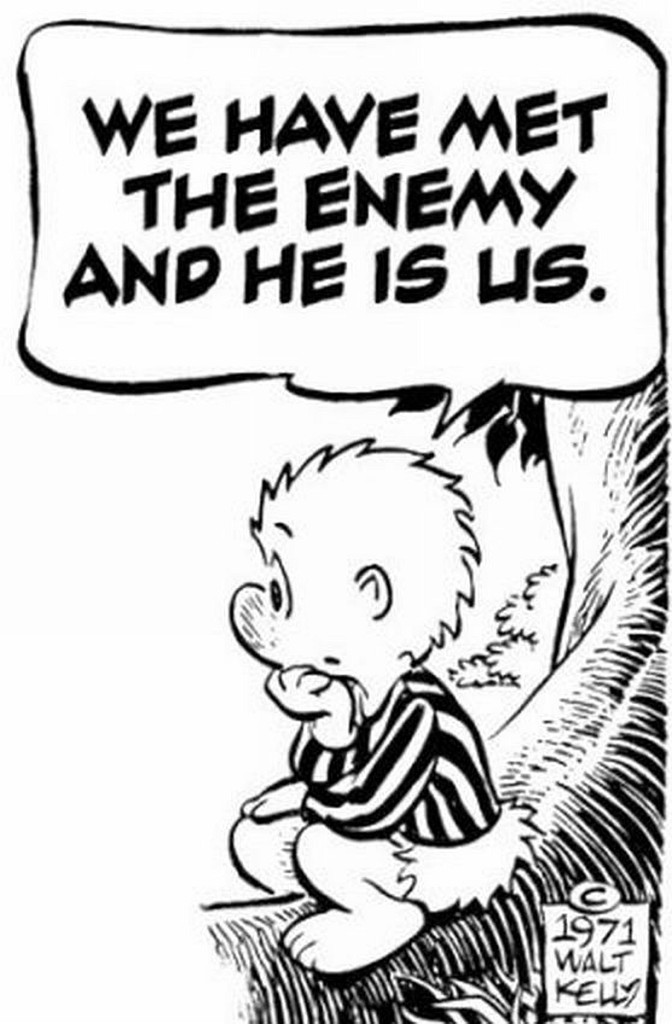Who is it that you and your “tribe” love to hate? Why is it that more often than not when we join some group – either in some official capacity or simply within our mind – that we end up identifying some other faction that “our group” all agrees upon disliking?
I remember vividly a presentation by futurist at a conference that I attended a few years ago and his making the statement that the only way he felt we humans would all come together as “one people” would be if some alien society attacked earth. His point was this – we would need that external enemy in order to bring us together. Left to our own devices, he believed we would always be compelled to break into smaller groups so we could always have some “other” to focus our disdain upon.
This reminds me of many years ago when I was supervising a component with the Federal government and my agency was attempting to institute of variation of Deming’s total quality management ideas. One part of this project was an major move towards creating “teams” and ensuring that all components were operating under “teamwork principles”. I can still remember one of my staff – an individual who was a high producer, a freethinker and very independent – telling me that the only way our group was going to come together as a team was if we could identify some “common enemy”. I like to believe that we did create a fairly synergistic team without resorting to the creation of an external foe – although in retrospect, the political leadership at the top who forced this change upon us might have somewhat played this role!
Is There a Psychological Need for Creating Enemies?
There is plenty of scientific evidence to support that our physical systems evolved to alert us to differences in our environment. We more we were attuned to how things “out there” in our physical world contrasted, the more we could be prepared to take advantage of environmental benefits (such as available food) and avoid external dangers (such as threats to our life). Seeing differences has served us through our animal evolutionary past.
Yet early humans were able to overcome their individual differences so as to come together in tribes and groups to enhance their sense of safety. Scientists have long studied the natural tendency we have for empathy – especially within our species and group – to bond us together. We cared for our vulnerable youth for years, increasing their individual survival. We protected one another in our group and they protected us, increasing our collective survival. Hence, bonding within a group served our evolution. Yet our natural tendency to detect differences “out there” in other groups of people combined with our sense that we were in competition with them for scarce resources fed a need to continue identifying enemies.
A few years ago, a group of psychologists conduct an interesting study that led them to “argue that people attribute exaggerated influence to enemies as a means of compensating for perceptions of reduced control over their environment.” Individuals in their study “were especially likely to attribute influence over life events to an enemy when the broader social system appeared disordered.” In other words, if you perceive that things are out of control and things are going bad, we tend to find someone to blame the bad things upon. And, since there is always some degree of feeling out of control for most people, there is always some sense of seeking someone to credit with creating our misfortune.
Many people feel an even greater sense of loss of control with all of the complexity we experience in our modern lives. Therefore, it appears that there is some psychological and evolutionary reasons as to why we are experiencing so much labeling of others as an enemy.
Who Is Your Common Enemy?
Everywhere we look in modern society, we find groups of people who have defined some other group as the ones “to blame”.
Fundamentalists (whether Islamic, Christian or other faiths) see fault in everyone who does not believe as they do. In the best case scenario, they simply condemn the non-believers to “eternal damnation”, in the worst case, they resort to violence and war to force their beliefs upon them or eliminate them.
Militant atheists blame much of the world’s ills upon all religions and the humans who buy into such “ignorant” ideas.
Conservatives and Fox “News” have identified all progressives and especially President Obama as their “enemy” (with a shift lately towards Hillary Clinton).
Progressives tend to target large corporations, big money and the so-called “elite” as the object of their scorn.
I could go on but you get the picture. No matter which group you identify with, your group has more likely than not lumped “blame” on some other camp.
Do We Really Need a Common Enemy?
Does it really have to be this way? Are we humans perpetually doomed to a future of pitting one group against another? Do you really believe that you have to have someone to dislike? You have a personal choice. You don’t have to join in with the complaining about “those people” that your self-identified group has decided to blame.
The pessimist side of everyone reading this will say, “it may be sad, but it’s true, we will always have to have someone to hate.” But, for many of us, there is a slight crack in that belief. Somewhere deep inside us we feel that there will be a time when we evolve beyond the need to seek another to heap our guilt upon. We know it does not have to be this way. Yet, does this shift in consciousness have to be only in the far off future of science fiction or can we bring ourselves to let go of the need to demonize an “other” now?
Releasing Our Common Enemy
Ultimately, we really do all have one common enemy that we need to release. The one enemy that we all share is not some external person or group. Our common “enemy” is the common belief that each of us holds that we have to dislike, hate or blame some “other out there” for the things in our life that are not to our liking. Our common “enemy” is our clinging to a belief that we are not connected, that we are these separate entities in competition with one another for scarce resources, control and power. Our common “enemy” is our acceptance of those “survival” beliefs instilled within us through our animalistic evolutionary past and our lack of willingness to evolve in our consciousness towards a greater spiritual future.
In the famous words of the comic strip Pogo, “we have met the enemy and he is us.”
But we can change our consciousness. We can claim a new belief. We do not have to define our world as “us versus them”. We can let go of our anger, fear, hatred and distrust of those who are different from us. We can release the need to have an enemy. And in each of us doing that within our own individual consciousness, we can actually all come together to release our one true common enemy.
Mark Gilbert
Read more at: http://consciousbridge.com/wordpress/articles/bridge-building/uniting-u-s/releasing-our-common-enemy/

